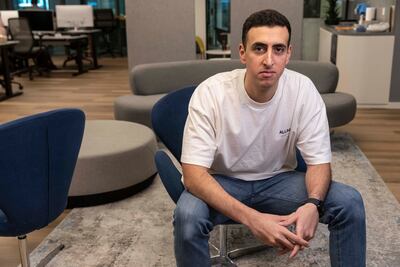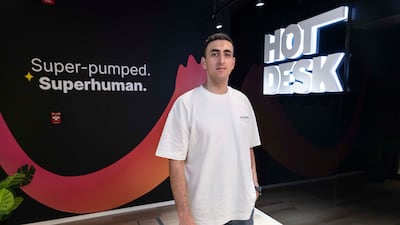Mohamed Khaled is co-founder and chief executive of Hotdesk, a Dubai on-demand and subscription workspace booking platform launched in September 2021 as part of what he calls “work 3.0”.
Mr Khaled, an Egyptian, grew up in Cairo and conducted audits with PwC across the Middle East before joining technology company Swvl ahead of its Nasdaq listing.
Now available in 40 countries and receiving 10,000-plus bookings monthly, Hotdesk recruited talent from Careem, Uber, Swvl and Google and plans to expand in Saudi Arabia following significant growth in the UAE and Egypt.
Now 29, the father of two lives in Mudon, Dubai, and aims for Hotdesk to become the region’s first “decacorn” (valued more than $10 billion).
What was your exposure to money growing up?
My family had the rollercoaster when it came to money. I pretty much experienced almost all different variations of how much we had and made.
My dad was in the navy, turned real estate businessman and then went on to flour mills. My mother worked in the hotel industry.
The first couple of years of my life were lavish — huge homes, international school, the whole package. But we experienced downturns, either the economy or my father’s business. We would sell our house, rent a place, shift schools but then, somehow, make more money again.
It was always up and down. It gave me a feel for appreciating money in a different way. My dad had flexibility, but uncertainty; he could make a massive gain or massive loss.
Did that make you aspire financial stability?
My father focused on education, to build better offspring to go into solid employment because he was trying to battle the risks he faced.
I didn’t know yet but I wanted to build something. I needed to learn first, work in an organisation that had super solid governance structure. I decided to go into PwC.
How much was your first salary?
The pay [then] was not that good — about $340 a month. Although it is a household name, with me coming out of the top university in Cairo, $340 was a radical shift.
I met my soon-to-be wife, started getting into a serious relationship. She lived two hours away, so I spent most of it on fuel.
Was money a motivation?
Obviously, making money is important, but at that time I was focused on multinational clients I consulted and audited through PwC. It was more about the learning experience than making money.
Shifting to Dubai and Abu Dhabi made things better (financially) — a different market, way more pressure, but better pay.
Why Hotdesk?
The lightbulb moment was I used to travel a lot with PwC. I had office access in 158 countries as part of this consulting network.
How could I create something like this for the masses? This was before remote work was a thing (May 2019).
You have co-working spaces around the world that are 86 per cent fragmented, more than 8,000 different brands, all with different pricing, websites, locations, booking mechanisms … typical aggregator opportunity.
You connect them all on a single app and a person or team looking for space can have access to virtually any piece of commercial real estate on demand. There are different types of users — from freelancers to hybrid workers, remote workers to start-ups.
co-founder and chief executive of Hotdesk
What’s your spending and saving stance?
It is primarily a balance. Every person needs an emergency fund you can access on demand; in 2023, it is easy to fall into debt traps.
My biggest returns are made on time; my time is the most valuable asset because it creates millions of dollars in value for shareholders. I have to save time more than I have to save money.
So, if something is going to make my life more efficient, I will spend that money over saving it, and save time to deliver more value.
I would rather have a more efficient lifestyle that enables me to grow the income, to then save in bulk.
Did parenting adjust your outlook?
You are suddenly responsible … schooling and diapers. I have two kids; one is four, one almost a year old.
I was sort of in transition from PwC, I hit a little period of personal economic turbulence.

Looking at my son, I realised the value of money. Money is not just paper or digital currency; it is home, food, safety.
It is a realisation you have to be sensible to protect your family.
What is your best investment?
A comfortable life. It is not a single item. It is investing in yourself and life infrastructure to allow you to do the most work, because I need to be a “torpedo”.
When you go into entrepreneurship, you don’t answer to a boss, you answer to the entire market, to investors, employees, partners, to users, and if you don’t make it, there is no soft pillow.
Work-life balance is super healthy, but you cannot create a $100 billion company by chilling.
Any key financial milestones?
My first salary in Cairo. The second milestone was being in Abu Dhabi earning a Gulf-based salary … I am not saying I made a tonne of money.
The third was raising my first round of equity financing with Hotdesk. It is amazing but you cannot mistake it for success.
Any cherished expenditure?
Spending half my salary on my first date with my now wife and the remaining half on gifts of gratitude for my first-degree family, for everything they had done for me to reach the point where I was generating my own income.
So, all the education, food I consumed, the things they had to go through to get me there, to give me a decent life. It usually goes unnoticed.
How do you feel about money?
Money is a tool and it is a result of things. Money, in its nature, is not good or bad, rather what you make of it. Money can amplify certain behaviours.
Take care of yourself, health, wealth and love, but also make sure to give it away because others around you need a warm meal, a blanket in the winter. What goes around comes around.
When are you happiest spending?
Experiences such as a having quality time with people you love. Exploring is something I would happily spend on and having a comfortable experience doing that.
If business class is a points upgrade, fine; if not, then no because we have to be efficient with spending. Lavish spending … I’m not that person.
How do you grow your wealth?
I believe where I can make most money in my lifetime is my business, so this is primarily where I focus my time, over investing.
And what lifestyle I need to become a better operator. How can I be more efficient?
Health and love are amazing but without wealth, you cannot invest in healthy food, in your relationship … you cannot buy a home or set your family up.

